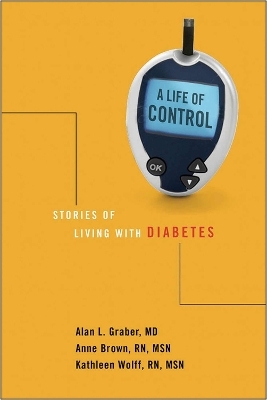
A Life of Control
Stories of Living with Diabetes
Seiten
2010
Vanderbilt University Press (Verlag)
978-0-8265-1733-3 (ISBN)
Vanderbilt University Press (Verlag)
978-0-8265-1733-3 (ISBN)
Comprising nearly forty personal narratives, this book tells the stories of actual patients with diabetes and draws upon the experience of an endocrinologist and two nurse practitioners. It provides an account of the health professional's view of diabetes control and the perspective of the patient.
Diabetes happens in a life that already has a story. This book, composed of nearly forty personal narratives, based on taped interviews, about the lives of actual patients with diabetes, draws upon the collective experience of an endocrinologist and two nurse practitioners who worked together for twenty-five years. The people who describe their experiences with diabetes range from teenagers to physicians, immigrants, athletes, pregnant women, accountants, a prisoner, and a dairy farmer. They speak of the variety of ways they handle monitoring, diet, insurance coverage, sports, and fashion. Some talk of how they manage to drive trucks for a living or, for recreation, fly airplanes or go spelunking. Many speak frankly of their anxieties and frustrations. The authors acknowledge that both the patient and clinician have a story about their relationship, and describe the richness and tension in their interaction. Families, too, are sources of both support and conflict. These relationships are acknowledged in the organization of the book, which is divided into sections defined by the main elements of diabetes control: patient self-determination, the role of the family, the social situation, and the patient-clinician encounter. The book provides a wealth of information about diabetes, including material on prevention, complications, and new technology, as well as a superb glossary, but it is not intended as a textbook on diabetes or as a self-care manual for patients. Rather the book provides a textured account of the health professional's view of diabetes control and the perspective of the patient whose life is complicated by diabetes.|Diabetes happens in a life that already has a story. This book, composed of nearly forty personal narratives, based on taped interviews, about the lives of actual patients with diabetes, draws upon the collective experience of an endocrinologist and two nurse practitioners who worked together for twenty-five years. The people who describe their experiences with diabetes range from teenagers to physicians, immigrants, athletes, pregnant women, accountants, a prisoner, and a dairy farmer. They speak of the variety of ways they handle monitoring, diet, insurance coverage, sports, and fashion. Some talk of how they manage to drive trucks for a living or, for recreation, fly airplanes or go spelunking. Many speak frankly of their anxieties and frustrations. The authors acknowledge that both the patient and clinician have a story about their relationship, and describe the richness and tension in their interaction. Families, too, are sources of both support and conflict. These relationships are acknowledged in the organization of the book, which is divided into sections defined by the main elements of diabetes control: patient self-determination, the role of the family, the social situation, and the patient-clinician encounter. The book provides a wealth of information about diabetes, including material on prevention, complications, and new technology, as well as a superb glossary, but it is not intended as a textbook on diabetes or as a self-care manual for patients. Rather the book provides a textured account of the health professional's view of diabetes control and the perspective of the patient whose life is complicated by diabetes.
Diabetes happens in a life that already has a story. This book, composed of nearly forty personal narratives, based on taped interviews, about the lives of actual patients with diabetes, draws upon the collective experience of an endocrinologist and two nurse practitioners who worked together for twenty-five years. The people who describe their experiences with diabetes range from teenagers to physicians, immigrants, athletes, pregnant women, accountants, a prisoner, and a dairy farmer. They speak of the variety of ways they handle monitoring, diet, insurance coverage, sports, and fashion. Some talk of how they manage to drive trucks for a living or, for recreation, fly airplanes or go spelunking. Many speak frankly of their anxieties and frustrations. The authors acknowledge that both the patient and clinician have a story about their relationship, and describe the richness and tension in their interaction. Families, too, are sources of both support and conflict. These relationships are acknowledged in the organization of the book, which is divided into sections defined by the main elements of diabetes control: patient self-determination, the role of the family, the social situation, and the patient-clinician encounter. The book provides a wealth of information about diabetes, including material on prevention, complications, and new technology, as well as a superb glossary, but it is not intended as a textbook on diabetes or as a self-care manual for patients. Rather the book provides a textured account of the health professional's view of diabetes control and the perspective of the patient whose life is complicated by diabetes.|Diabetes happens in a life that already has a story. This book, composed of nearly forty personal narratives, based on taped interviews, about the lives of actual patients with diabetes, draws upon the collective experience of an endocrinologist and two nurse practitioners who worked together for twenty-five years. The people who describe their experiences with diabetes range from teenagers to physicians, immigrants, athletes, pregnant women, accountants, a prisoner, and a dairy farmer. They speak of the variety of ways they handle monitoring, diet, insurance coverage, sports, and fashion. Some talk of how they manage to drive trucks for a living or, for recreation, fly airplanes or go spelunking. Many speak frankly of their anxieties and frustrations. The authors acknowledge that both the patient and clinician have a story about their relationship, and describe the richness and tension in their interaction. Families, too, are sources of both support and conflict. These relationships are acknowledged in the organization of the book, which is divided into sections defined by the main elements of diabetes control: patient self-determination, the role of the family, the social situation, and the patient-clinician encounter. The book provides a wealth of information about diabetes, including material on prevention, complications, and new technology, as well as a superb glossary, but it is not intended as a textbook on diabetes or as a self-care manual for patients. Rather the book provides a textured account of the health professional's view of diabetes control and the perspective of the patient whose life is complicated by diabetes.
Alan L. Graber is an endocrinologist; Anne W. Brown and Kathleen Wolff are certified diabetes nurse practitioners. In 1986, while in private practice, the authors organized one of the first Outpatient Diabetes Education Programs in the country recognized by the American Diabetes Association. They later worked together for many years at the Vanderbilt Eskind Diabetes Center.
| Erscheint lt. Verlag | 30.11.2010 |
|---|---|
| Verlagsort | Tennessee |
| Sprache | englisch |
| Maße | 162 x 227 mm |
| Gewicht | 360 g |
| Themenwelt | Sachbuch/Ratgeber ► Gesundheit / Leben / Psychologie ► Krankheiten / Heilverfahren |
| Medizinische Fachgebiete ► Innere Medizin ► Diabetologie | |
| ISBN-10 | 0-8265-1733-1 / 0826517331 |
| ISBN-13 | 978-0-8265-1733-3 / 9780826517333 |
| Zustand | Neuware |
| Haben Sie eine Frage zum Produkt? |
Mehr entdecken
aus dem Bereich
aus dem Bereich
Vol. 1 & 2
Buch | Hardcover (2022)
McGraw-Hill Companies (Verlag)
229,99 €


